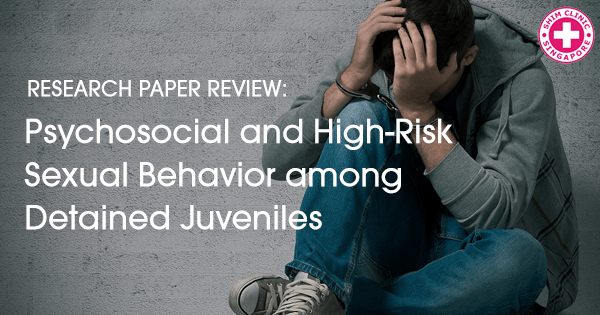A Juvenile is a child between the ages 13-17 years of age, who has been detained in a correctional facility or a child’s remand for a given period of time. Sexually transmitted infections could prove to be a difficult case with most of them having a recurrence if not treated properly. Young girls and women are said to be worst affected by STIs/HIV, particularly by gonorrhoea and chlamydia. Psychosocial factors are also said to be directly related to high STI/HIV prevalence.
STI’s are known to increase the risk of one contracting HIV infection. According to research, when compared to other African American girls/women who have not been detained but are vulnerable are also at risk of getting STIs/HIV. This population is also said to have increased mental health issues.
Psychosocial Factors Experienced
Psychological issues are characterized by abuse including physical, sexual, verbal or emotional abuse. Spousal and opposite sex violence is another common form of abuse. These psychosocial issues among others have brought about high exposure to STI’s and HIV infection.
This is according to research conducted by Gates et al in the year 2015 published by JMIR Research protocols. The researchers conducted a descriptive study that surveyed 26 young women aged 13-17 years and who have been incarcerated by a department of juvenile justice. The study aimed at evaluating the connection between psychosocial risk factors, STIs and HIV, in relation to reducing and preventing such diseases.
According to the research, the outcome of sexual relationships dynamic is associated with high risk of sexual behaviors, contracting STI’s and exposure to HIV. The researchers recommend a risk reduction plan for this population be put in place, bearing in mind the psychosocial status of this group.
The Findings
Out of 26 young African American women studied, 81% of them had inadequate knowledge about STIs, 52% did not feel powerful in their relationship, 56% were afraid of suggesting condom use, and 60% did not feel comfortable to say no to sex. Sadly 68% find no real meaning in relationships.
According to research, the young women are involved in unprotected sex due to lack of information and lack of the power to say no to their partners. The National HIV/AIDS Strategy for the United States has a plan laid out for the risk reduction, treatment and prevention. The research further declares that about 63% of the infected by HIV as well as STI’s are the African American population women.
Possible Causes and Suggestions
According to research, exposure to early cases of abuse, sexual violence and an environment of substance abuse, alcohol influence leads to trauma and the beginning of a cycle characterized by the same. The African American population seems worst hit by this. The research further proves that the difference in races is high, in terms of exposure, self-drive and willingness to learn and improve.
The study suggests that, use of condoms, practice of safe sex, being faithful to one’s spouse, self-awareness and self-respect with some level of assertiveness should be practiced. Self-accountability regarding avoidance of sex under the influence of self-indulged substances or alcohol and change of lifestyle would go a long way in improving the HIV risk infection factors.
Our Take
Helping women suffering from psychological issues and who are already vulnerable to STIs/HIV contraction should be given attention because it can greatly prevent further transmission of these infections. Frequent STD testing and HIV testing should be made readily and economically available to these vulnerable juveniles. Modern preventive treatments like HIV PEP are extremely helpful in cases of sexual abuse to ensure HIV infection does not set in case of exposure, as long as it is within 72 hours.


Pingback: Regular Testing Increases Access to HIV Prevention Drug PrEP